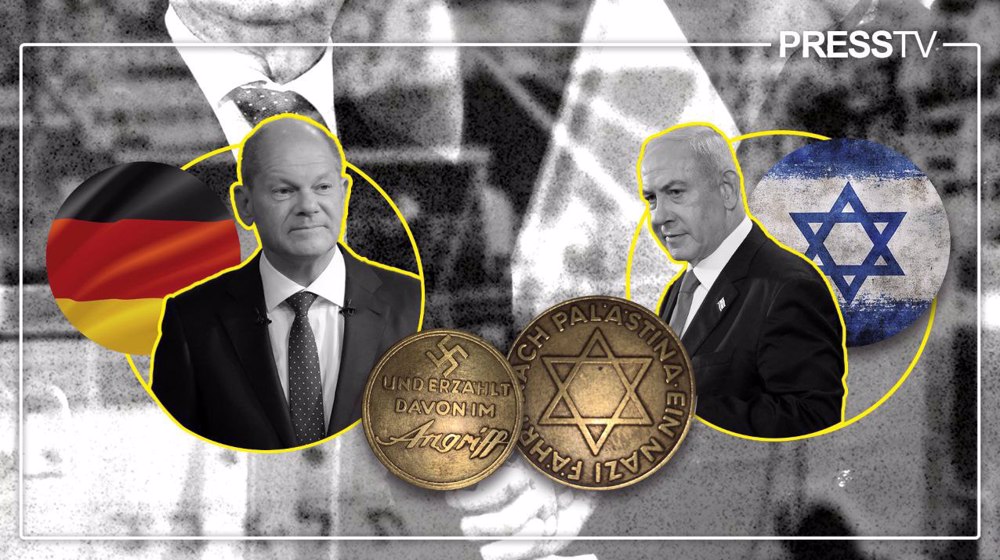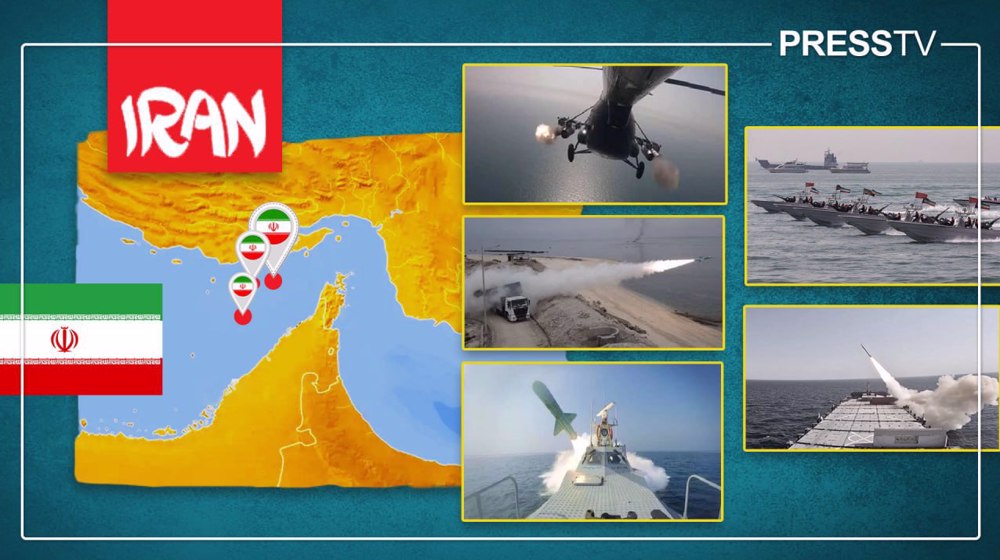Haavara to Hague: Germany's stance on ICC arrest warrants unmasks deep Zionist ties
By Musa Iqbal
International Criminal Court’s (ICC) landmark decision to issue arrest warrants for Israeli regime leaders Benjamin Netanyahu and Yoav Gollant has sparked outrage from Western leaders, who have for decades used the Hague-based tribunal for political agendas.
Though the arrest warrants are riddled with glaring contradictions, such as describing Hamas military leader Mohammed Deif as a "war criminal" and equating Hamas resistance leaders with war criminals in Tel Aviv, the warrants are still significant because even the institutions founded by the Western world are unable to dismiss the criminality of the Zionist regime.
But now comes the true test: are the states that are signatories to the Rome Statute, which recognizes the authority of the Hague-based international tribunal, willing to follow through with their pledge?
Many countries have reluctantly expressed their willingness to accept the decision - such as Canada, Italy, and the Netherlands, just to name a few. However, some have been more reluctant, retreating to “analyze” the verdict issued by the ICC.
Perhaps the case that deserves the most attention is that of Germany, a Rome Statute signatory and one of the biggest allies of the child-murdering Tel Aviv regime that has been deeply complicit in the Gaza genocide.
A German government spokesperson, Steffen Hebestreit, said he "finds it hard to imagine" that they would make arrests "on this basis,” questioning the authority and decision of the Court entirely.
Naturally, these statements have caused a stir, and have journalists pressing German officials on what their stance actually will be on ICC arrest warrant, which took more than six months to make headway.
German Foreign Minister Annalena Baerbock, when pressed on the enforcement of the warrants, retreated.
“As I said, we abide by the law and legislation nationally, at the European level and internationally, and that is why we are now examining exactly what that means for us for implementation in Germany," he said.
She made no comments regarding whether Germany would follow through with the arrest warrants, despite being obligated as a signatory of the Rome Statute - something Hebestreit mentioned himself.
Germany has been one of the most staunch European supporters of the Zionist entity, particularly amid the ongoing genocidal war on Gaza, refusing persistent calls to halt arms sales to the Tel Aviv regime.
Time and time again - throughout the decades - Germany has attributed its ironclad and unconditional support for the Israeli occupation to its own Nazi-era crimes against Jewish people in the 1930s and 40s.
Germany claims it is motivated to support the Zionist regime because of its own guilt.
But this is a complete distortion of the truth. The fact of the matter is, the German Nazi regime was a direct collaborator with the Zionist movement from the early days of Nazi party rule in Germany.
In fact, while most Jewish organizations were banned, the lone organization permitted to legally exist was the German Zionist movement, under different initiatives.
To the uninitiated, an alliance between the Zionist movement and the Nazi regime seems completely contradictory. But when looking at the material desires of both the Zionist movement and that of Nazi Germany, the motivations become quite clear and obvious, and manifested in the infamous Haavara Agreement, signed by the Zionistische Vereinigung für Deutschland (Zionist Federation of Germany) and the German Reich Ministry of Economics in August 1933.
The agreement is quite simple: in exchange for Jewish immigrants (particularly, those loyal to the Zionist doctrine, and some of the most wealthiest - indicating it was never about moralism but rather preserving class interests within Zionism) to safely leave Germany, the Nazi regime would help transfer the Jewish population themselves to Palestinian territories, accelerating the removal of indigenous Palestinians from a territory where they were already persecuted by a growing Zionist population and British colonialism.
The Nazi regime received tremendous material benefits for this. Jewish organizations were enacting worldwide boycotts of the German regime at the time, on the grounds of the Nazi laws persecuting the Jewish population in Germany.
The Nazi regime saw this as a major threat, as it created grounds for economic isolation in a post-World War I world. The open collaboration with the Zionist movement allowed the Nazi regime to dodge the accusations of antisemitism, and further dangerously conflated anti-Zionism with anti-Semitism, a defense the Zionist regime would use to the modern day.
Furthermore, the German government was able to enact further economic deals under Haavara, which resulted in a new German market in the British-occupied Palestinian land.
The agreement materially improved a heavily boycotted Nazi regime while laying further groundwork for the Zionist colonization of Palestine. The transfer of wealth was often cited and met with glee in Zionist-controlled media in occupied Palestine.
Fast forward 91 years. The German government, which has enacted laws that criticism of the Israeli regime is “anti-semitic” in nature, is yet again making a callback to its Nazi roots.
Hebestreit, quoted in The Telegraph, states that “it is a consequence of German history that we share unique relations and great responsibility with Israel.”
This is completely true, but not in the context in which they are using to deceive the public. Germany is not defying the ICC arrest warrants because of any shame to its Nazi crimes. Rather, functionally speaking, it is the same dedication to the Zionist movement Germany declared in 1933, in order to not only evade allegations of anti-Semitism, but continue making billions of dollars from exports to the Zionist occupation.
Refusing to enforce the ICC warrants means that Germany can continue its arms shipments to the Zionist occupation. Just last month, Germany approved a sale of over $100,000,000 worth of arms to the Israeli regime. Some researchers suggest that Germany exports nearly 30 percent of the arms sent to the occupation regime.
Germany is in a particularly debased state of affairs, due to its close allegiance to the United States. The American insistence to cut off energy imports from Russia as well as the US involvement in bombing the Nord Stream II pipeline has drastically impacted the German economy.
The economic peril due to this commitment the led the German government to collapse earlier this month. However, the US encourages its allies (rather, proxies) to continue arming the Israeli occupation.
The road ahead indeed goes both ways. German purchases of Israeli surveillance and military equipment, recently and most notably the Arrow 3 ballistic defense systems raised eyebrows to Palestinian solidarity organizations. There is also documentation that German police have purchased Israel’s infamous Pegasus software to be used for spying on its own citizens.
Acknowledging the ICC arrest warrants means that the imports and exports of arms come to a grinding halt.
Indeed, the reluctance to enforce the ICC arrest warrants on behalf of the German government is not rooted in any sense of “moralism.” This is a talking point to earn the sympathy of Western liberals who still do not see the massive fingerprint of their own governments in the ongoing Gaza genocide.
The root of the decision, as it usually is within the context of imperialism, is money. Germany is solely motivated by its role as a junior agent in American imperialism, hoping to make a quick buck while its US masters erode its own energy infrastructure.
A refusal to enforce an already toothless warrant, which attacks two Israeli regime leaders and not the issue of Zionism itself, is simply the German government conducting business as usual as it has for over 90 years.
The infamous Haavara agreement lives on today, not in its original context, but not far from it either. Germany's stance on the ICC arrest warrants against Netanyahu and Gallant reveals deep ties to Zionist rooted in the Haavara agreement.
Musa Iqbal is a Boston-based researcher and writer with a focus on US domestic and foreign policy.
(The views expressed in this article do not necessarily reflect those of Press TV.)
VIDEO | Press TV's news headlines
ICC: US sanctions 'flagrant attack' on global justice
VIDEO | Clashes in Brussels as farmers demand greater EU support
VIDEO | Gaza’s displaced struggle to survive deadly winter storm under blockade
Advocacy group DAWN launches website exposing 'Faces of AIPAC'
US ambassador meets Palestinian official in Ramallah: Report
UAE exposed as secret buyer in huge arms deal with Israel: Report
Trump, Netanyahu planned war on Iran since February: Report










 This makes it easy to access the Press TV website
This makes it easy to access the Press TV website